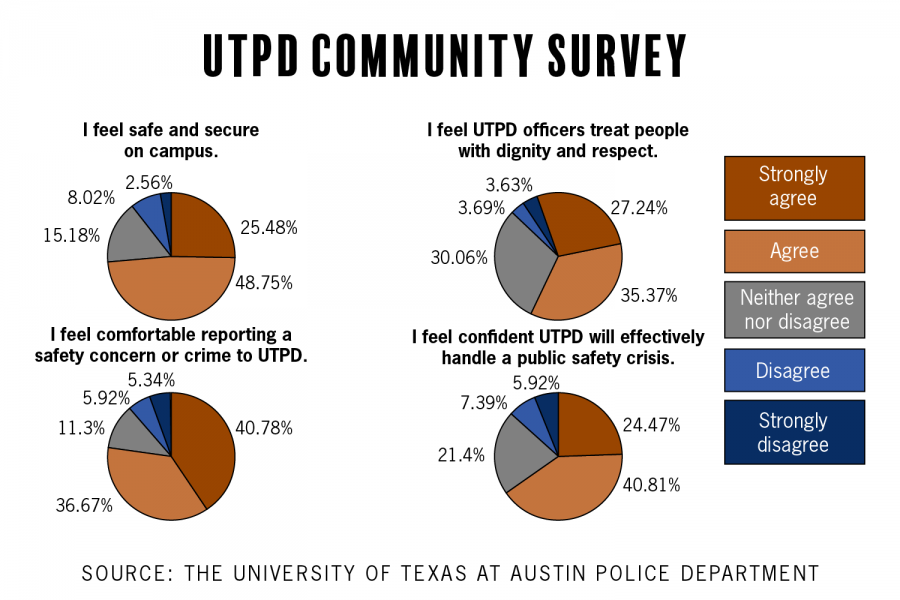Nearly 75% of UTPD survey respondents feel safe on campus, but some say results may not reflect student body opinions
April 28, 2021
A majority of students, faculty and staff who responded to a campus safety survey conducted by the UT Police Department said they feel secure on campus and believe UTPD can effectively handle public safety crises. However, some students feel that the results do not represent the opinions of UT’s student population.
The biennial Commission on Accreditation for Law Enforcement Agencies (CALEA) community survey is conducted to allow the commission to assess UTPD’s performance as a department. The survey was available on the UTPD website from April 5-12 and was sent to the UT community via email.
The survey received 4,515 responses, with students making up 47% of responses, 11% faculty and 40% staff. Approximately 74% of respondents said they feel safe and secure on campus, while about 15% had no opinion and 10% disagreed.
About 65% of respondents said they feel confident UTPD will effectively handle a public safety crisis, 21% had no opinion and 13% disagreed. Similarly, 78% said they feel comfortable reporting a crime to UTPD, while 11% said they did not feel safe and another 11% had no opinion. A little over half of the respondents said they had never interacted with UTPD.
The survey respondents were 57.8% white, 3.6% Black, 14.2% Hispanic, 12.0% Asian and 12.4% identified as other. UT’s student population is 38.9% white, 5.3% Black, 23.4% Hispanic, 20.2% Asian and 12.2% other, according to the UT website.
Jeremiah Baldwin, a Universitywide representative in UT Student Government, said he worries the survey results may not accurately reflect the opinions of students in marginalized groups.
“With surveys like the one UTPD put out, you have to think about who is going to answer those surveys and what are the demographics of our University?” said Baldwin, a government and African and African Diaspora studies sophomore. “There could definitely be some ways that we reach out and target specific communities in terms of hearing their perspective … maybe by going to the Multicultural Engagement Center.”
Acting UTPD Chief Don Verett said he understands some people may be hesitant to report crimes to the police due to bad experiences with law enforcement.
“We want people to feel comfortable talking to us and to give people a positive experience with the police services,” Verett said. “People tend to have interactions with the police when they’re not particularly at their best or reporting a crime where they’ve been a victim. We want to respond with empathy and kindness.”
Baldwin said as a person of color, he has difficult feelings about using police as the primary measure for public safety. He said the University should continue to look for ways to prevent crime and provide safety resources.
Government and political communication junior Grace Widner said she has hesitations about contacting UTPD because she did not think they were helpful when she called the department for assistance with a crisis her freshman year.
“It doesn’t make me feel more safe to have an increased police presence,” Widner said. “UT needs to invest in preventative measures rather than policing in order to make more students feel safe.”
Verett said most members of the UT community meet police in stressful situations. He said proactive outreach may be UTPD’s best solution to building relationships so people can meet officers in less negative contexts.
Verett said critical responses can be the most helpful to making sure UTPD is addressing community needs. While the survey is no longer active, UTPD accepts ongoing feedback through their website where people can submit comments on recent police interactions.
“Everybody always wants to get a good report … but at the same time, we need to know where we’re lacking … so it gives us opportunities to improve,” Verett said.



